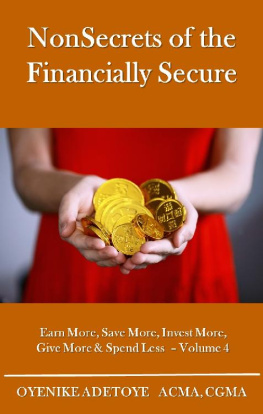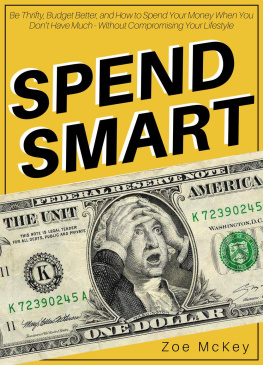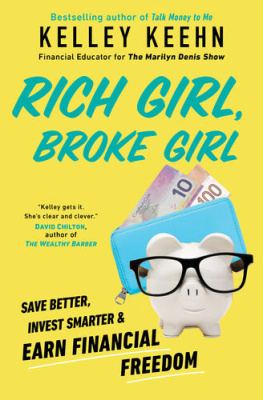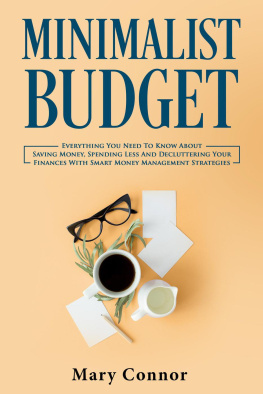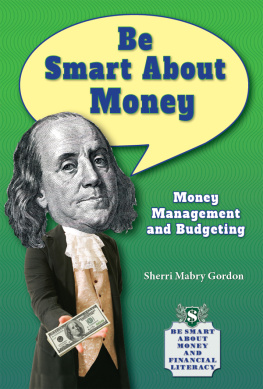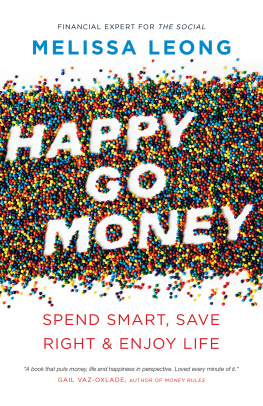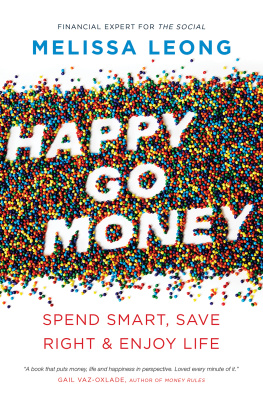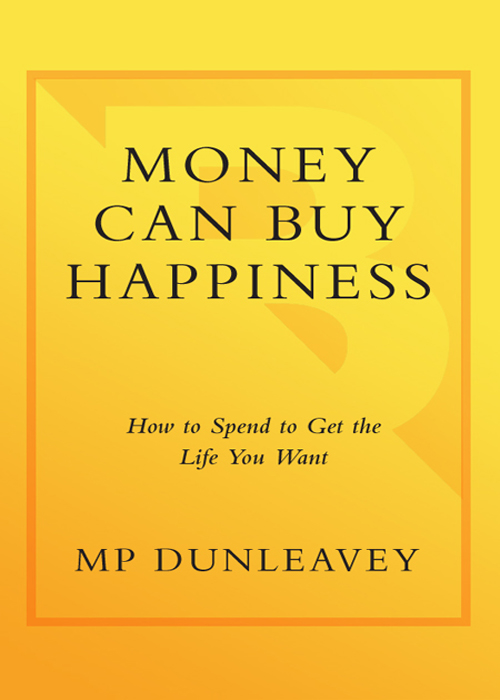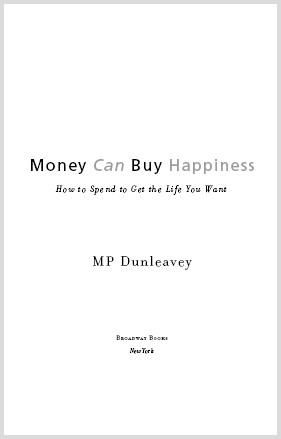Introduction
Who Says Money Cant Buy Happiness?
W hile its true that you cant go to Costco, plunk down your Visa, and get a lifetime supply of contentmentor good health, true love, or even a nice daythat doesnt mean the old clich that money cant buy happiness is true. Were so obsessed with obtaining the material goods money can buy that weve lost track of the fact that happiness is one of the most powerful things money can buy. And thats what this book is about.
There are days when I just wish the salary fairy would wave her magic wand and quadruple my income. Or that the lottery fairy, her elusive twin sister, would slide a winning ticket under my pillow. Then, I sigh to myself, then Id be able to buy everything I want, and THEN Id be happy!
Unfortunately, the desire to have not just enough money but lots of moneystupid money, as they sayhas evolved from a wistful fantasy to something of a cultural obsession. In just a couple of centuries weve gone from being a fledgling republic committed to life, liberty, and the pursuit of happiness to a nation of frenzied shoppers willing to commit bodily injury to take advantage of Wal-Marts holiday sales.
Something is wrong.
People are working long hours, on top of even longer commutes, getting through one billing cycle so they can pay the next, leveraging their homes, spending so much on the present theres little saved for the futureall in the name of enjoying some mythic quality of life. So where is it?
THE AMERICAN DREAM?
Susan and Hazen, a couple I met in upstate New York, could write a modern parable about how the American Dream has gone awry.
A few years ago these two really did have it all in the way that popular culture defines having it allfrom their high-profile, jet-setting jobs to their spacious Brooklyn loft to trips abroad, nights at the theater, designer shopping sprees. But after they got married in 1997, they couldnt shake off a growing sense of dissatisfaction. For my part, I got married because I wanted to spend time with Susanand we werent, says Hazen, thirty-nine. Either she was in London or I was in L.A., and even when we were both at home our schedules werent jibing.
Susan, forty-three, had a similar epiphany. Shed achieved all the material goals shed aimed for in her twentiesyet none of it was as satisfying as shed dreamed. Youre on this path to consumerism, coming home with new clothes every weekend, or things for the houseall this stuff for very little gain in the end, she says. We didnt get to spend more time doing the things we wanted to doI didnt get to spend any more time painting or bikingbecause we were spending all this time working.
Certainly there are things in life that money cant buy, but its very funnydid you ever try buying them without money?
Ogden Nash
The irony of the fact that they were each earning six figures didnt escape either one of them. Youd look at the numbers on the tax return and think: Where did it all go? Hazen recalls.
Whether or not you bring home a six-figure income, I bet youve experienced some version of what Hazen and Susan were going through. When youve spent the better part of your adult life chasing a certain kind of success or happiness, its distressing to wake up to the fact that all youve earned isnt bringing you the wonderful life it was supposed to. Yet this has been the reality of consumer America for the last fifty years.
If I asked you whether America is, overall, a wealthier country now than it was after World War II, youd probably say yesand youd be right. But if I asked whether our prosperity has made us happier as a people, you might hesitate. Despite living in possibly the richest country on earth, during the most prosperous time in history, researchers have found that Americans are not more satisfied with life, in general, than they were a few decades ago. According to a 2006 study by the Pew Research Center, between 1972 and 2004, Americans reported the same general level of happinessdespite the fact that during those decades the average per capita income more than doubled (accounting for inflation). Thus, in the aggregate, Americans have more money now than they did a generation ago, the authors of the study wrote. But in the aggregate, were no happier.
In fact, when economists have studied the extraordinary growth in national and personal wealth in most Western countries in the last few decades, theyve found that more cars, better appliances, and bigger homesthe most common measures of prosperityhave not boosted peoples well-being one iota. Yet earning more, buying more, having more (and more) stuff seems to preoccupy us all, as though acquiring a certain lifestyle might bring the happiness we seekas though we can afford to ignore the escalating level of financial insanity in our lives.
SPENDING IT ALL AND THEN SOMEFOR WHAT?
The total personal debt in this country, not including mortgages, is at an all-time high of more than $2.2 trillionand climbing. People have become so accustomed to spending money they dont have that credit card debt has increased from $238 billion in 1989 to over $804 billion today. Bankruptcy rates have skyrocketedwith the highest number of filings among Americans aged 35 to 44, and the second-highest rates among young adults aged 25 to 34. And still we keep spending. In 1995, Americans borrowed about $11 billion in home equityby 2005 that amount had soared to $243 billion. Granted, the real estate boom made it possible for countless homeowners to cash out money their homes had earned, but to what end?
Annual income twenty pounds, annual expenditure nineteen six, result happiness. Annual income twenty pounds, annual expenditure twenty pound ought and six, result misery.
Charles Dickens, David Copperfield
People now have so much stuff that the number of storage units nationwide increased from about 22,000 in the early nineties to nearly double that ten years later. Thats billions of square feet designed to hold the things weve boughtand no longer use or need. The savings rate has plunged to its lowest level since the 1930s, dipping into negative numbers throughout much of 2005. While some economists quibble about those figures because they dont take into account certain types of savings, like home equity, the fact is that people are spending moreand saving lessof their disposable income than at any other time in history.
I had more clothes than I had closets, more cars than garage space, but no money.
Sammy Davis Jr.
Yet this nonstop elbowing for material success means that instead of becoming enriched, we are depleted. In getting and spending we lose our irreplaceable time, our valuable energy, our personal and spiritual creativity. Worse, we are slowly forgetting how to invest our money in ways that do make us happy.
First and foremost, Id like you to see this as an investment book. Instead of focusing on bonds and mutual funds, Im going to show you how to invest your time, energy, and above all your money in your own long-term, tax-free, high-yield happiness. Which is exactly what Hazen and Susan finally decided to do a couple of years ago.
The turning point came when they began to look at their quality of life the same way an investor weighs the performance of stocks in his portfolio. If spending all their time and energy and money in pursuit of success wasnt giving them the quality of life they dreamed of, what would? They knew what their priorities were: We knew we both loved the outdoors, we loved to traveland we loved to work, says Hazen. They also knew they didnt want to live in an urban area anymore, and they wanted to spend more time together. The time had come to invest their resources in the life they wanted. But how?


